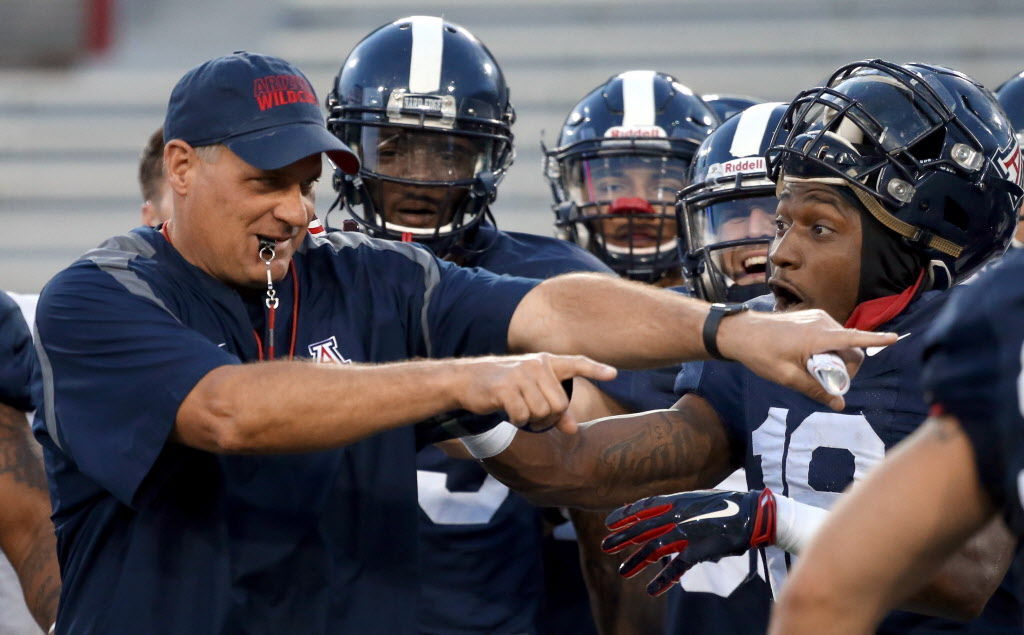Well, that didn’t last long.
Less than a month after banning so-called “satellite” recruiting camps, the NCAA rescinded the ban Thursday.
The initial decision drew widespread criticism from coaches and players in the Pac-12, Big Ten and other conferences. It had been pushed by members of the SEC and ACC who were concerned about Michigan coach Jim Harbaugh and others encroaching on their territory.
The NCAA explained the pros and cons of the camps in a news release announcing the reversal:
“The camps and clinics rule received widespread attention after its adoption, with supporters contending the rule would keep coaches on campus with current student-athletes and steer recruiting toward the scholastic environment. Detractors believe the camps provide opportunities for previously un-recruited student-athletes to be noticed by high-profile coaches and possibly receive scholarships.”
Arizona coach Rich Rodriguez ripped the NCAA for hastily implementing the ban, calling the decision “silly” and “disingenuous.”
Regarding the camps themselves, Rodriguez said last week: “I think it’s been overwhelmingly positive in giving other student-athletes that maybe (are) not getting a look, to give them an opportunity to show themselves and get a scholarship. It’s been overwhelmingly more good than bad.”
On Thursday, Rodriguez tweeted his support for the NCAA’s change of heart:
Excited for student athletes that the satellite camp ban was lifted. #opportunites
— Rich Rodriguez (@CoachRodAZ) April 28, 2016
The NCAA Division I Board of Directors also directed the Division I council to “conduct a broad assessment of the FBS recruiting environment … including potential modifications to camps and clinics participation,” according to the news release. The hope is that some acceptable middle ground can be reached.
It’s draft day! Here’s some of the latest buzz on Arizona’s top prospects:
- The best-case scenario for the Wildcats’ highest-rated player, linebacker Scooby Wright, is to come off the board sometime on Day 2. If that happens, it’d likely be late on Day 2, meaning the middle or end of the third round. The most realistic landing spot, based on what I’m hearing, is Round 4. Round 5 is considered the floor.
- It’s entirely possible – maybe even probably – that safety Will Parks will be the second Arizona player selected. Parks has risen on boards during the pre-draft run-up thanks to his athleticism, character and versatility. He could go as early as Round 5.
- No one has been more bullish on Wright than Pro Football Focus, which at one point had him as a late first-round pick. PFF ranked Wright 71st in its final Top 250. That would put him in the third round.
- PFF’s analysts also are big fans of Parks, ranking him 100th on that list. That would put him in the late-third/early-fourth range. He’s two spots below Ohio State quarterback-turned-receiver Braxton Miller, whom many project as a second-round selection.
- PFF did not rank Arizona receiver Cayleb Jones in its Top 250. That’s consistent with recent seven-round mock drafts that did not include Jones. (This year’s draft has 253 selections.)
- Jones’ stock appears to have tumbled, but we won’t know for sure how much until Day 3 of the draft. To illustrate how much opinions can vary, Matt Miller of Bleacher Report ranked Jones as his No. 17 receiver and gave him a third-round grade. NFLDraftScout.com had him 47th as an undrafted free agent.





